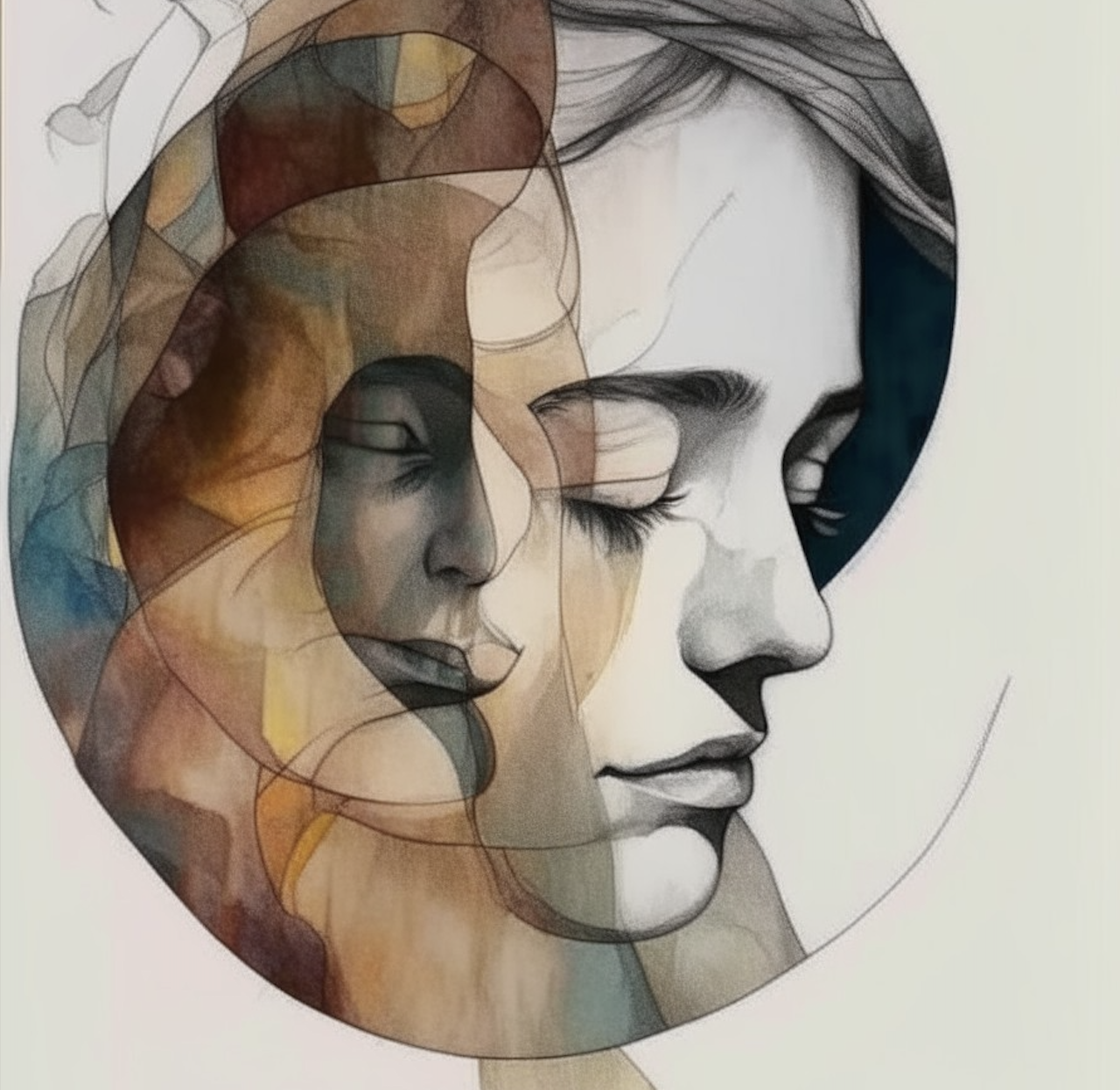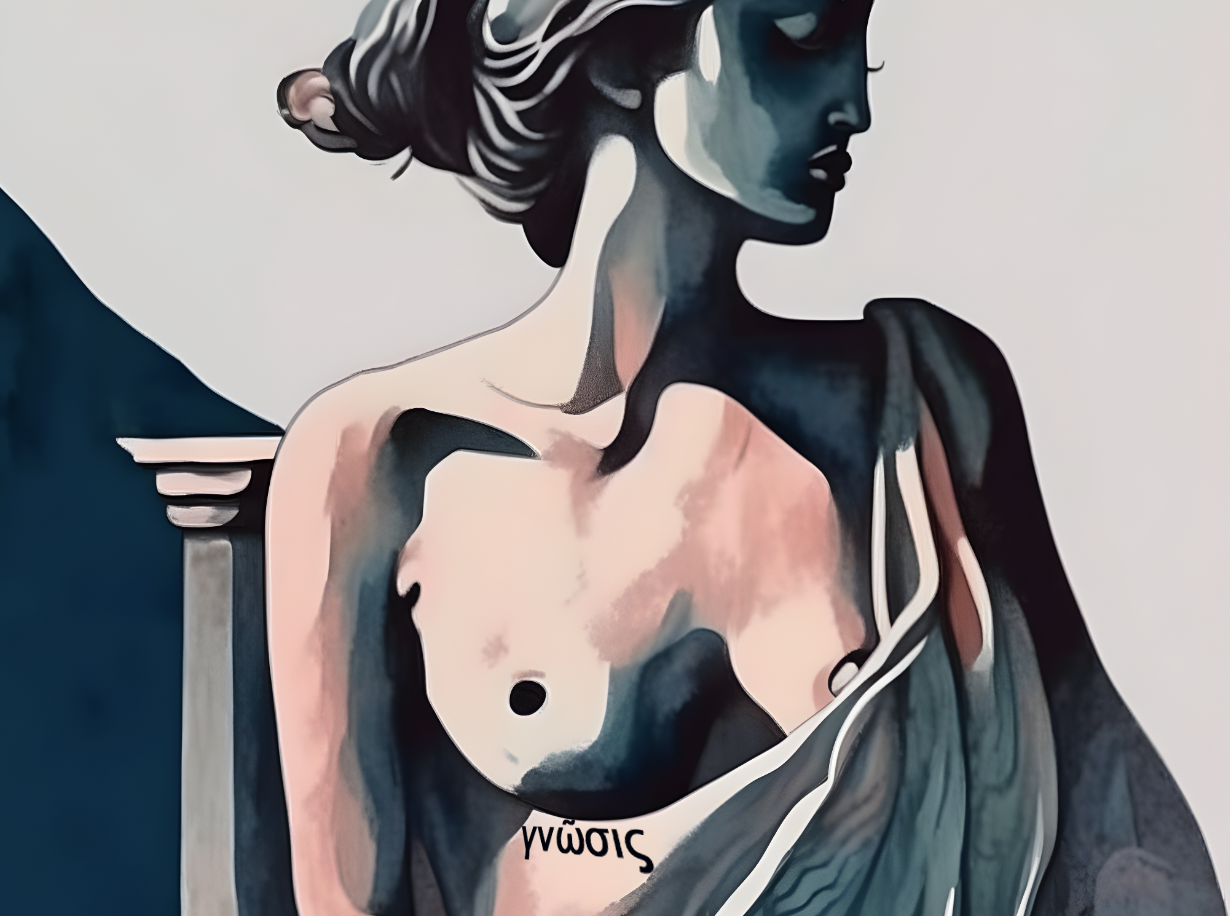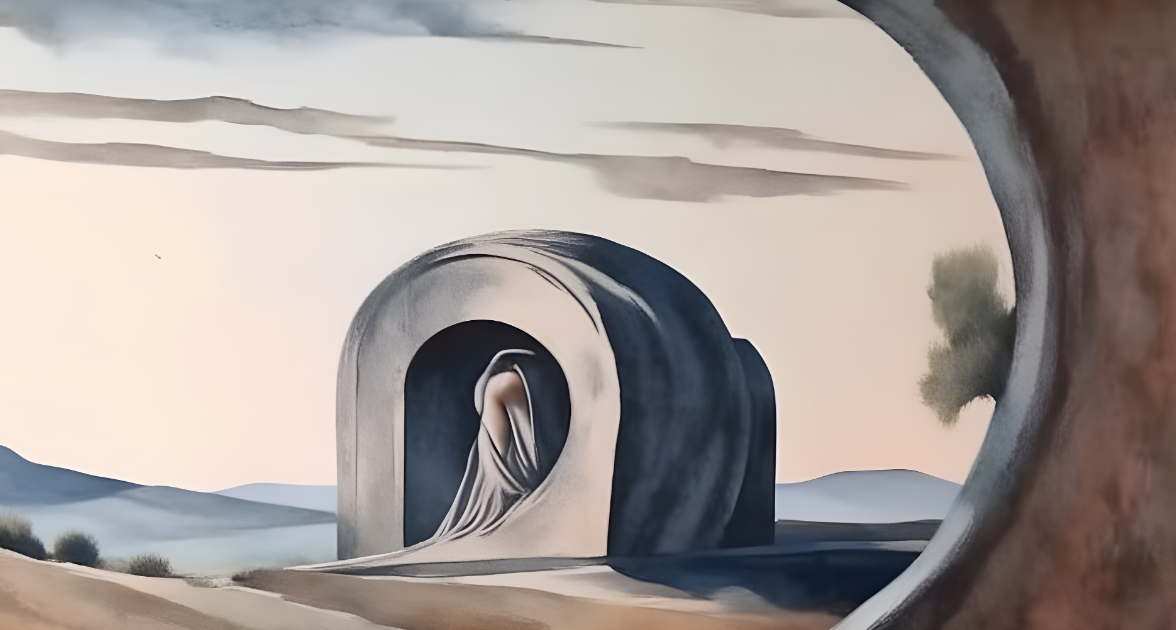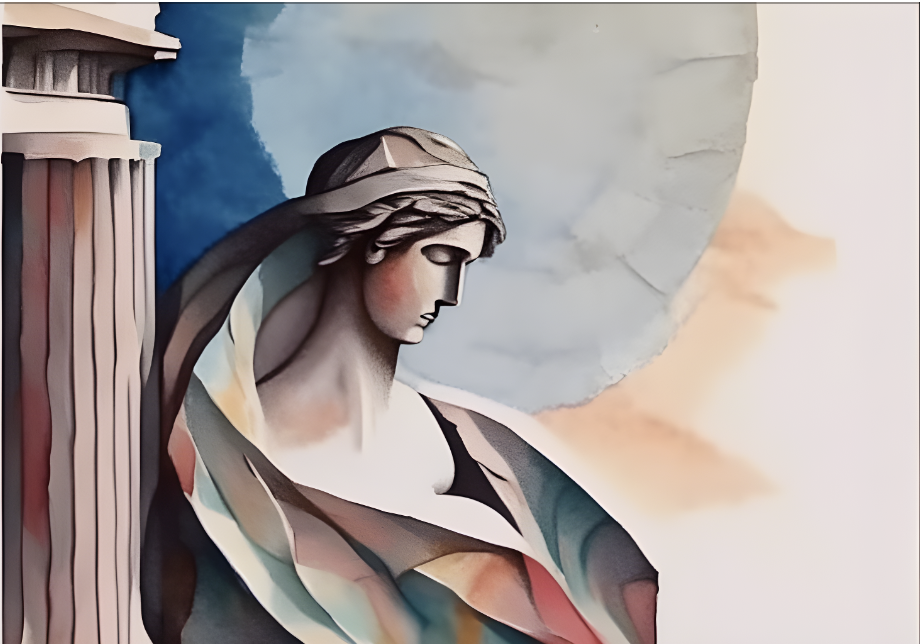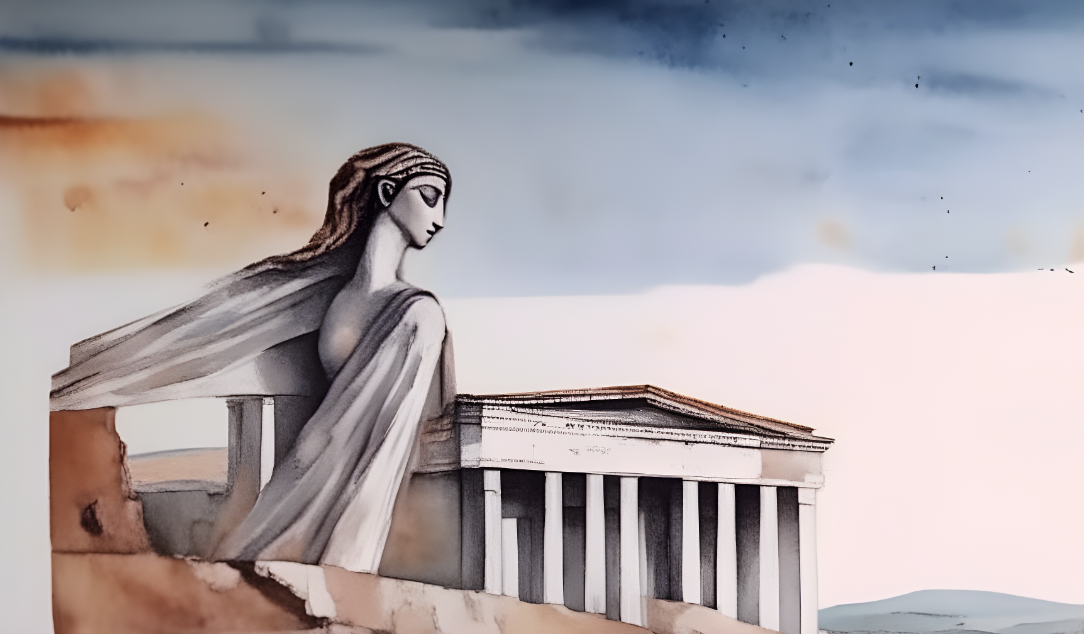The Loop
the mind
hates
an open
loop
like a bird hates an empty nest
it cannot rest in ambiguity
it must weave something with no rest
it does not care if the puzzle fits
only that it appears complete
the circle must be closed
even if fickle lies is all that holds it neat
vagueness is a vacuumed void
where the mind cannot breathe or escape
so it fills the emptiness with tales
echoes of half-truths to try resuscitate
and truth whispers quietly at the edge
but the mind—a desperate visionary
chooses to play deaf
over the noise of its own machinery
and just like that, the loop tightens
into the noose of reckoning
unless space is made for the opening
and the
unknown
becomes
nonthreatening
Pythagorean Mystery School
Pythagoras was no mere mathematician—he was a cosmic seer who heard the silent music of the stars and uncovered the divine code of existence. To him, numbers were sacred, the pulse of creation, binding the universe in perfect harmony. He taught that reality was a grand symphony, where every soul, star, and sound vibrated in eternal proportion. Entering his world meant awakening to the mysteries of life itself—a journey where mathematics became magic and the cosmos revealed its hidden song, introducing a way of living focused on spiritual practice, knowledge and the importance of a vegetarian diet. The Pythagorean Mystery School, established by the ancient Greek philosopher Pythagoras in the 6th century BCE, was a unique blend of intellectual inquiry, spiritual practice, and communal living, this school was more than just a centre for learning—it was a transformative way of life. Pythagoras believed that the universe was fundamentally mathematical, with numbers and their relationships forming the essence of all existence. To him, mathematics was not merely a tool for measurement or calculation but a divine language that revealed the structure of reality.
The Pythagorean approach to life was deeply philosophical and spiritual. Members adhered to a strict code of conduct that emphasised discipline, self-control, and harmony. Their practices included dietary restrictions, often vegetarianism, as they believed in the purity of body and soul. Silence was another essential practice, symbolising the importance of introspection and the idea that wisdom begins with listening. The school operated with a sense of mystery and secrecy; knowledge was shared only with those who proved their readiness through tests of character, intelligence, and commitment.
Tattoo Under the Breast
do you feel it?
the hum beneath your ribs
the echo of quantum whispers
writing you into being
you are not the storyteller
you are the story itself
ink bleeding across endless timelines
fragile, fluid, infinite, flesh
let yourself be read
and dissolve into the dictionary
for your plot is not in the words
but in the surrender to their meaning
The Philosophy of Hope
In Plato's philosophy, hope (ἐλπίς) is intricately connected to his overarching view of the soul, the Good, and the pursuit of truth. For Plato, hope is not merely a passive longing but a reflection of the soul’s innate desire to ascend from the shadows of ignorance to the light of knowledge and ultimate reality. This ascent is driven by a deep yearning for the Good, the highest and most perfect form that orders and illuminates all other forms. Hope, in its truest sense, aligns with reason and understanding, guiding individuals toward the eternal and unchanging truths that transcend the fleeting and deceptive world of sensory perception. Yet, Plato acknowledges the dual nature of hope. When grounded in ignorance, it becomes a delusion—a misguided expectation based on the illusions of the material world. Such false hope can ensnare the soul, keeping it tethered to the cave of illusions. However, when rooted in the rational contemplation of higher truths, hope becomes a virtuous force, inspiring the soul to strive for wisdom and harmony with the cosmos. In this way, hope for Plato is not an end in itself but a dynamic force that, when properly guided, elevates the soul toward its ultimate fulfilment in the realm of the eternal and the divine.
Salty Blood
they say
greeks have salty blood
as if the tides course through their veins
and the waves remember them by name
my mother’s mother tasted the sea
before she suckled the teat of the land
as trojan horses galloped the swollen blue
crashing against poseidon’s hand
sinking into a seafoam of myths and lulls
now I float buoyant above the bones
of ancestors carved in coral and stones
sacrificed on the ocean floor
and their memory now but lore
Metaphysics & Art: Universals & Particulars
The philosophical debate between the distinction of universals and particulars centres on whether certain qualities exist independently of themselves or only as specific instances in individual objects. As a working artist the simplest way for me to illustrate this distinction is by utilising the collection “Monochrome: The Blue Epoch” by Yves Klein’s. The collection is famously known for eleven identical looking artworks all painted in a distinct blue called “International Klein Blue” which he patented in 1960.
Your Velvet Mind
your mind
is velvet
delicate to the touch
yet heavy in weight
in its folds
each thought
a stroke of something rich
and sensuous
draped in layers
you cannot see all at once
there is texture to you
the way your ideas
brush up against the world
smooth and rich
cloaked in mystery
draped in desires
both lush and deep
holding warmth and shadows
in equal measure
a curtained stage
you are the softness
and the strength
the quiet before the show
and the grand reveal
Ancient Greek Etymology Series: Nemesis
What magic can be conjured up when two deep passions are intertwined: a love for the origin of language and an adoration for Ancient Greek history and mythology. This series kicks off with the word ‘nemesis’. In our modern usage ‘nemesis’ can refer to someone or something that is the cause of one’s downfall or defeat. It can also be used to describe a situation or person that continually opposes or thwarts one's success, often implying a sense of inevitability. The root of the word comes from the Greek verb νέμειν (némein), which means "to give what is due" or "to allot." This verb carries a sense of dispensing justice, especially by punishing wrongdoing or overstepping one's bounds. The true origin of the word though is Νέμεσις (Némesis) originally referred to the mythical Greek goddess, Nemesis, she is the fearsome goddess of retribution, balance, and divine justice. She personifies the inescapable consequences of hubris (excessive pride) and arrogance, particularly when mortals overreach or believe themselves above the gods. Often depicted with large, imposing wings, Nemesis is a swift and merciless enforcer of cosmic order. She is usually shown holding symbols of justice: a sword to mete out punishment, a scourge to signify her role in delivering retribution, or scales to balance justice. Sometimes she is portrayed holding a wheel, symbolising the turning of fate. Her presence is always commanding, and her expression stern, reflecting her unswerving commitment to ensuring that the proud and unjust receive their due. Nemesis was believed to act not out of cruelty, but to correct the imbalance caused by excessive pride, ensuring the natural order remained intact. In myth, Nemesis is most famously associated with the tale of Narcissus, the vain youth who became infatuated with his own reflection. Narcissus, who cruelly rejected all who loved him, including the nymph Echo, was ultimately punished by Nemesis for his arrogance and self-obsession. She lured him to a pool, where he fell in love with his reflection and wasted away, consumed by unrequited love for himself. In another myth, Nemesis plays a role in the story of Arachne, a skilled weaver who boasted that her talents surpassed even those of Athena, the goddess of wisdom and craft. Arachne’s hubris angered the gods, and Nemesis ensured that she faced divine retribution—Arachne was transformed into a spider to weave for eternity. Nemesis also appears in more subtle forms of justice. She is said to have brought down kings, such as Croesus of Lydia, whose pride in his wealth led him to misjudge the gods’ will, ultimately leading to his downfall. Her role was not only to punish evil, but to restore harmony, reminding mortals that no one is beyond the reach of divine law.
Plato’s Allegory of the Cave & The Matrix
For those of you who have joined me on any of my workshops you will recall my deep passion for the science-fiction genre. It is an interesting and somewhat paradoxical passion to combine art history, mythology, storytelling and creative practice with this genre; yet it has played a huge part in my personal artistic journey and as a genre, science-fiction has captivated audiences for centuries, transporting them to imaginative realms and presenting futuristic concepts that challenge the boundaries of human knowledge and understanding. Beyond entertainment, there is a growing body of research suggesting that exposure to sci-fi can have a profound impact on the creativity of individuals, enhancing their capacity to contribute to innovation. Ray Bradbury said it best: “Science fiction is any idea that occurs in the head and doesn’t exist yet, but soon will.” However, what if the ideas and premise of one of the most successful sci-fi movies The Matrix was actually written over 2,400 years ago by the ancient Greek philosopher Plato and his Allegory of the Cave? Plato's Allegory of the Cave and the Wachowski siblings’ The Matrix are both profound explorations of perception, reality and knowledge. While separated by thousands of years, these works share a common theme: the idea that humans live in a world of illusion and that only through a process of awakening can they discover the truth. Plato's prisoners in the cave and Neo, the protagonist of The Matrix, undergo similar journeys from ignorance to enlightenment, challenging the boundaries of their perceived realities and showing how human cognition is both shaped and limited by the environments we inhabit.
Golden Hour
golden hour spills through the forest green
a syrupy glow of soft amber sheen
the trees stand tall, bathed in liquid light
each leaf a flame to the beckoning night
shadows stretch long, whispering low
the forest hums with the sunlit glow
the air is thick with a honeyed hue
where the day feels old but the sky feels new
branches cradle the sun’s last gleam
rays navigate a path towards moonlit beams
the warmth envelops the crisp so sweet
as day and dusk so gently meet
Bitterness, A Shield
when I am bitter, grief is my sword,
I grasp its hilt, convinced it's strength,
it burns, it rages, it roars a chord,
stretching weakness to greater length
the sting of pain, it cuts so deep,
I wear petulance like iron skin,
for if I’m strong, I’ll never weep—
a protective armour lets nothing in
but as the flames consume the night,
I feel the weight beneath its blaze,
a strength that’s hollow, brittle, tight,
that cracks and falters in ego’s gaze
for bitterness is forged in fear,
it shields the wound, but does not heal
true power lies when we draw near
the tender heart we try to seal
so now I see, that acidic taste wanes,
and in its place, a sweeter hue—
a strength that stands now takes the reigns
the kind that dares to just be true
What is Hellenic Mysticism? A Journey Beyond the Greek Rational Mind
The ancient Greeks are often credited with laying the foundations of logic and rational thinking, fundamentally transforming the way humans approach knowledge and understanding. Philosophers like Socrates, Plato, and Aristotle introduced systematic methods of inquiry, emphasising reason and evidence over myth and superstition. Socratic dialogue encouraged critical questioning and self-examination, while Plato’s works explored the nature of reality and knowledge through dialectical reasoning. Aristotle further advanced these ideas by developing formal logic, creating syllogisms that structured arguments in a clear and rigorous way. This intellectual revolution not only shaped philosophy but also influenced fields such as science, mathematics, and ethics, establishing a legacy of rational thought that continues to resonate in contemporary discourse. However, the intricate connection to mystical and religious practices often remain overlooked in the understanding of ancient Greek culture, which tends to emphasise on the emergence and establishment of rationalism and philosophy. But these mystical elements were not merely sidelined; they were actually integral to the Hellenic world, deeply influencing its most renowned thinkers and shaping its spiritual landscape. By exploring this mystical dimension of Ancient Greece, we uncover a realm where the divine and human intertwine, guiding us through a labyrinth of rituals, beliefs, and transcendent experiences that challenge our contemporary understanding of the ancient Greeks.
The Art of Storytelling, Myth & Marketing
We as humans are created through the medium of story; of narratives plucked from the shimmering stars in the heavens above to the haunting tales from a dark underground abyss. Our legends, heroes, fears, hopes and dreams were forged around a campfire. The flickering flames and crackling embers created an intimate, almost ethereal setting where voices and shadows blend, facts and fiction merge, drawing listeners into the journey of what it means to be human. The stories, rich with drama and imagination, become vivid as the firelight dances across faces, heightening emotions and making each narrative feel immediate and personal. This simple yet profound setting enhances the power of storytelling, turning it into a communal experience that forges bonds and stirs the imagination, leaving an indelible mark on everyone gathered. Storytelling as an art form has always been a powerful tool to engage, influence, teach, and inspire. This is particularly evident when we explore the rich tradition of Greek mythology and the divine nature and power of these tales. In marketing, the power of storytelling and mythology lies in their ability to forge deep emotional connections and create memorable experiences for the consumer to engage with. By weaving a brand’s or organisation's message into a compelling narrative, marketers can evoke the timeless appeal of mythological archetypes and themes, which resonate on a fundamentally human and almost primal level.
Publication Date Announced: “MUSE”
I’m incredibly thankful to announce the updated publication date for my second book “MUSE” this has been a true labour of love: she is an art-journal that moonlights as a sketch book with inspirational prompts. She is part musings, part of my poetry, part of my hand illustrated artworks.
I hope all of these scattered little parts of myself help my fellow creatives find some space to lay bare their brave and beautiful musings too. Many of the works are incomplete or works in progress that I have left in as drafts. Nothing is perfect in this book, it never is, it is all beautifully broken.
We are expecting a mid-2025 release date. Take a peek inside to see a few page spreads.
The Mythological Dimension of Resurrection
In ancient Greece, the concept of resurrection, though not always framed in the same terms as in modern religious contexts, was a significant aspect of mythology, ritual, and philosophical thought. The Greeks grappled with the nature of life, death, and rebirth through their myths, religious practices, and philosophical inquiries, reflecting a complex understanding of existence and the afterlife.
Xenia in Ancient Greece: Lessons in Surrender and Forgiveness
Xenia was more than a practice in ancient Greece; it was a divine mandate. Rooted in mythology and religious observance, xenia was believed to be protected and enforced by Zeus Xenios, the god of hospitality. This sacred relationship between host and guest was based on mutual respect and trust, underscoring the belief that proper treatment of guests and hosts was a reflection of one’s piety and character. Among the various customs and rituals associated with xenia, one notable gesture was the act of grabbing the knees of the person you were requesting forgiveness or surrender, a physical sign of supplication and humility.
Ancient Akrotiri - Art Insights
Our recent trip to the ancient archeological site of Akrotiri brought us face to face with one of the most exciting and masterful examples of Minoan artistry: the Akrotiri Fisherman fresco, captivating us with its vibrant portrayal of maritime life this artwork is far beyond its years in regards to proportions, details, features and body posture. Dating to the late Bronze Age, this fresco, uncovered on the island of Santorini, transports us to a sun-drenched moment where time seems suspended. The scene is animated with dynamic figures of fishermen, rendered in fluid, rhythmic lines that convey both their grace and the rhythm of their daily toil.
The fresco’s vivid palette—comprising deep blues, rich ochres, and lively reds—evokes the shimmering Mediterranean waters and the abundance of its bounty as well as the rich colours of the Santorini rockface. Each fisherman, clad in minimal but elegantly detailed attire, appears engaged in the art of fishing with a sense of both purpose and ease. The naturalism with which these figures are depicted, combined with the attention to the textures of the fish and the intricate patterns of their nets, underscores the sophistication of Minoan artistic conventions. This fresco not only illustrates a vital aspect of Minoan life but also reveals a cultural appreciation for the symbiotic relationship between humanity and nature, immortalising a moment of industrious harmony in a vibrant, timeless tableau.
“The Women of Amphissa” - Art Insight
The Story Behind the Painting: Lawrence Alma-Tadema’s "The Women of Amphissa" (1887) portrays a beautiful moment of humanity amidst chaos. The painting is based on a story from Plutarch’s Moralia, where a group of women who had been celebrating the Bacchanalia, a festival for Bacchus (Dionysus), are found sleeping in the marketplace of Amphissa. After a night of wild dancing and ritual frenzy, they are vulnerable, having unknowingly wandered into a city allied with their enemies. Instead of taking advantage of this situation, the women of Amphissa step in to protect these women, offering food and care. Alma-Tadema captures the tenderness of this moment, transforming a tale of conflict into one of female solidarity and protection.
The painting is heavily rich with symbolic details. The scattered bacchantes, with their disheveled hair and languid poses, contrast with the women of Amphissa, who are portrayed as dignified and composed. Alma-Tadema carefully uses light to emphasise the peacefulness of the scene—soft whites and pale pinks dominate, creating a serene atmosphere. The architecture in the background adds to the sense of strength and security, as the women of Amphissa surround the bacchantes like protective pillars.
The Wisdom Found in Water: Lessons from Ancient Greece
Water, the essence of life and a symbol of profound wisdom, has held a special place in human culture and philosophy for millennia. In ancient Greece, water was not merely a physical necessity but also a sacred element imbued with deep symbolic and spiritual significance. From the myths of gods and nymphs to the philosophical musings of great thinkers, the ancient Greeks saw water as a source of wisdom and insight. Exploring the historical and symbolic roles of water in ancient Greece offers us timeless lessons that resonate with our modern lives.
The Intersection of Mythology & Creativity
The annual Mythologium conference is just around the corner and this years theme being Myth & Creativity will no doubt offer an in-depth showcase and understanding around artistry and inspiration through the modality of myth. The intersection between creativity and mythology is complex and exciting, each enriching the other in profound ways. Mythology, as a collection of traditional stories, legends, and symbols from various cultures, offers a plethora of archetypes and narratives that fuel creative expression from historical stories to our modern TV series. These ancient tales, passed down through generations, reflect universal human experiences and aspirations, which artists, writers, and creators draw upon to produce new works.
